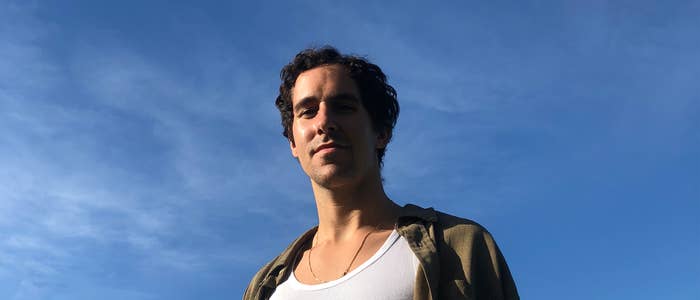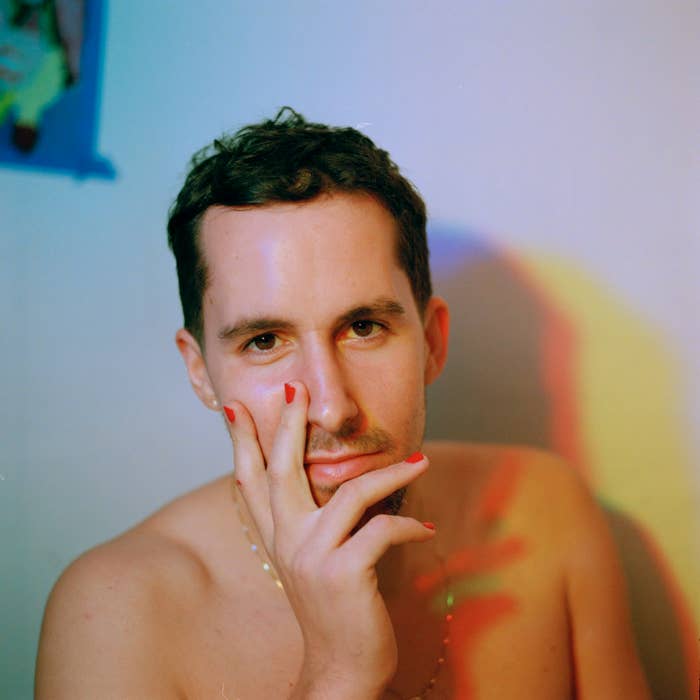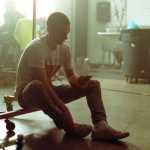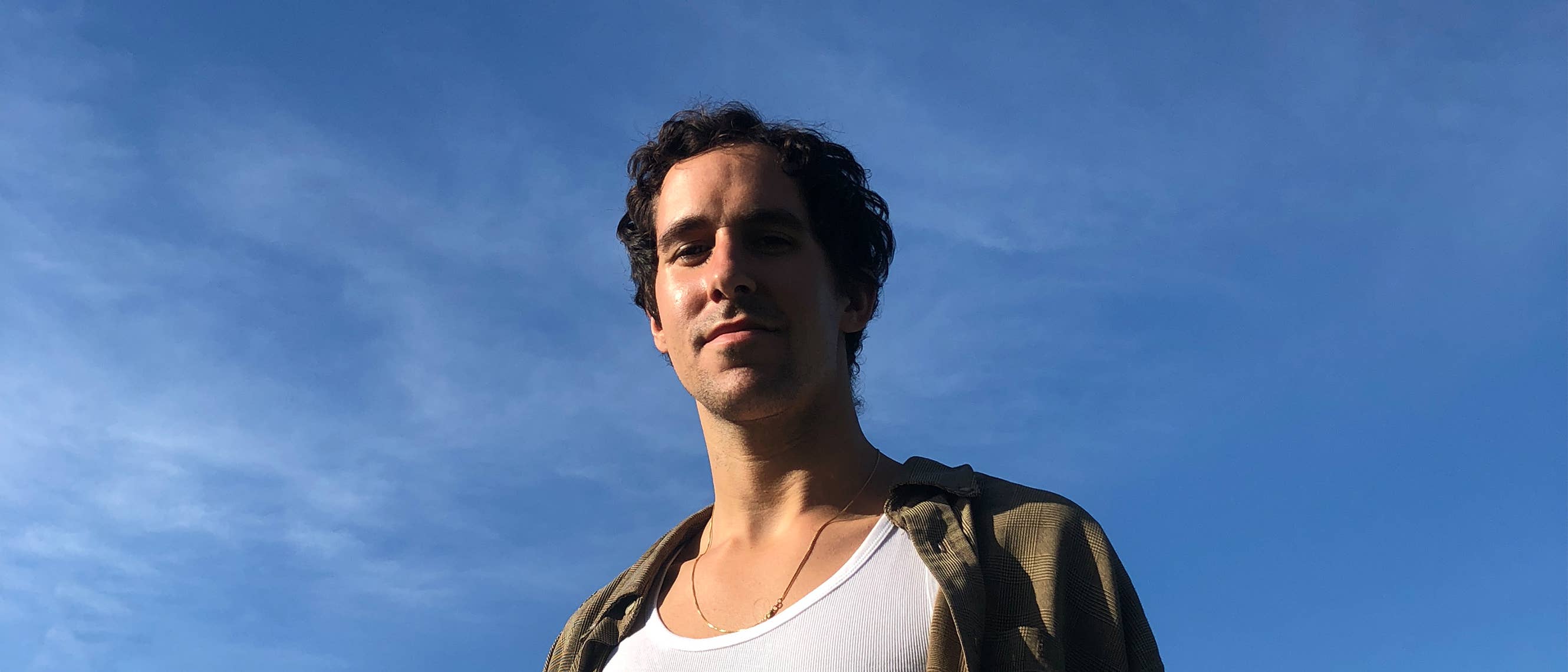
When pianist Matt Tavares announced he would be taking a break from touring with BADBADNOTGOOD, tremors of anxiety ran through the Canadian quartet's fanbase. Matty's piano is a central component to their live show—would the band be able to tour without him? Was he going to come back?
Those fears can be laid fully to rest. Matty is still a recording member of the band, and today announced his DÉJÀVU album. It arrives in full on June 15, and the news comes with a delicious new single, "Clear." We got a sense of his new sound on previous singles like "Embarrassed," and "Clear" continues down a similarly wavy, psych-rock path. He's adopted a sighing, falsetto-heavy delivery that pairs naturally with the song's wiggling synths and muted keys—it's a distinct, complete piece of artistry that served as both a creative outlet and a form of therapy.
"I was really struggling with my identity in BadBad versus being an individual," Matty tells us. "When you’re in a band, and that band starts taking up the majority of your time, you start seeing yourself as just part of this thing. It was a fractured identity, at the time, but now I’m not. Now I’m proud of who I am and what we’ve done."
The album was created alongside super-producer Frank Dukes. The two artists kept the project a closely guarded secret for some time—Matty invited in his bandmates for finishing touches when it was nearly finished, a choice that makes for an intensely personal and authentic record. Listen to "Clear" below, then read on for our interview with Matty.
The project is really good, congratulations. How long have you been working on it?
I started working on it about three years ago, started writing a bunch of songs when I stopped touring with BadBad. I showed some of them to [Frank] Dukes, who’s a really close friend of mine, and it just went from there.
I saw the very nice note from BBNG about your album—is it safe to say the solo material isn’t the result of an acrimonious split?
Oh yeah, they’re my family. There are times—like any family—where you have personal issues, but they get resolved and you still love them. There’s so much love, and they’ve been so supportive with me stopping touring. It’s been super amicable, and it’s by no means derailing what I’ll do with BBNG in the future.
You mentioned earlier you were going through a tough time when you started working on the record…
It was a lot of things. Some of the stuff I don’t want to get into details, but BBNG became an intensely, full-time, demanding thing pretty much the second we started doing it. I was 19, and all of a sudden I was touring and doing 100 shows a year. It was really intense, constantly working on music, in the studio, on the road. I didn’t really stop to parse a lot of stuff that was happening in my life. It was a classic story—if you’re going through anything personal, and you’re on tour 24 hours a day, it’s really not a good thing. It just kind of exploded at one point, and I said “I can’t do this anymore.”
But it turned out to kind of be the perfect situation, because my former roommate filled in for me when I stopped touring. It was something I was really stressed about, because I didn’t know if the band would have been able to go on without me in a live setting. So much of it was the four of us. But it actually ended up working out.
It did feel like people were waiting for a band like BBNG when you all first started releasing music. You were hailed pretty quickly as the modern jazz saviors.
Yeah, totally. It was an incredibly overwhelming thing, and I am not necessarily a person who wants attention. It was amazing, but it would have been nice to have some sort of mental preparation, some solid understanding of who you are. I had no idea who I was at the time.
And then you come back with an album like this, which is so distinct from your work with BBNG. You said you’ve been writing songs forever, but what did you learn about yourself and your production when you were making this solo album?
I really think when I started working on the record, I didn’t have a sense of what I wanted to make. For the majority of my adult life, I was making music for other people. The record was my first experiment with making my own decisions musically. Dukes was more in a therapy role, helping me to make the decisions I wanted to make. I wanted to make something that felt really personal, a record where I was facing up to feeling vulnerable, talking about things I don’t normally talk about. I don’t really sing, so that was a whole other thing.
I was very used to playing a show on piano, an instrument I’ve played my entire life. Singing is not something I do, but it’s something I like doing. Making this record was the exact opposite of making something with BadBad. With BBNG, it’s easy—all the other guys in the band are monsters at their instruments, super talented. There are already a lot of accolades, and when that starts happening you can make riskier decisions and people still validate you.
With this, it was kind of just like, “What do I do?” As cliché as it is, this record was really just me learning who I am, musically. As far as production stuff, I engineered and mixed the record too, but they were all experiments. I’m really proud of it.
When you were finding your voice so to speak, where were you pulling from? Who were you inspirations?
I started making the record right when I started going to therapy, because of the aforementioned stuff. So some of the lyrics were about stuff I was dealing with there—intimacy issues, self-consciousness, self-hatred, a lot of projection. I was realizing that in a lot of my relationships I was putting this unnecessary weight on people. I had never really thought about my life in that way. Everything seemed so external. Then I started writing all these songs, about the things that were upsetting me. And then I quickly realized, “Whoa, never mind. This is all my own stuff.”
A lot of the songs are songs I sing to myself. It’s about me being another person, but in these previous relationships. Like “How Can He Be,” that’s about me seeing someone with another person, but I’m that other person. That’s the narrative of the whole record.
It’s tough to step outside of yourself like that. What kind of reaction have you gotten, were people surprised to see this side of you?
I worked on this record in the dark in a lot of ways. Just me, Dukes, and then towards the very end I got the guys to play a couple of things, but the majority of the record was just me and Dukes. I was really struggling with my identity in BadBad versus being an individual. When you’re in a band, and that band starts taking up the majority of your time, you start seeing yourself as just part of this thing. It was a fractured identity, at the time, but now I’m not. Now I’m proud of who I am and what we’ve done.
The coolest thing was, I spent so much time on the record before I started showing it to people. The record basically already sounded like it does now. So people were like, “Whoa, this is crazy!” In that sense I think people were really surprised that this record was so fleshed out.
Were you consciously trying to move away from jazz?
I think the record was made unconsciously in a lot of ways. There were no real ideas that any of the songs should be any way. I’ve played jazz my entire life, it’s a huge part of my identity as a musician. But I also grew up listening to Guided By Voices, tons of ‘90s rock and The Beatles. All that stuff informs BadBad’s music too, but it just seemed like for whatever reason when I started playing, that other stuff suddenly had an outlet. Jazz is an approach to music. It’s many things, but it’s an approach to music, and I was doing that anyway. When I sit down to the piano, it feels like I’m coming at it with my knowledge of jazz, even if it’s a rock song. This whole thing was basically me trying to liberate myself from the boundaries I’ve imposed on myself.
How do you feel about jazz as a genre now as opposed to when BBNG first started?
It’s kind of incredible how popular jazz has become. Seeing Kamasi Washington on a huge stage with a 30-piece orchestra at Coachella… Four, five years ago that wasn’t happening. I think jazz music is something that’s incredibly universal. You can feel if it’s good. It’s based on improvisation, and so there’s this vulnerability involved that people want to connect to. I don’t know why it was less popular with people in my age group the last 30-40 years, but maybe it’s just how it was delivered.
Anything else you want people to know about this record?
Not to sound nonchalant about it, but I never really saw things in terms of the PR angle. It’s nerve-wracking for me to have conversations like this… I don’t know what I would want people to know. I made a record with people I love.
It’s music at the end of the day, you have to let it tell its own story.
Exactly. It’s not that serious, and I think it’s kind of pretentious to craft a mythology around it. I’m bad at angles… it’s a reflection of me as a person. It’s great if people like it, it sucks if people don’t.


